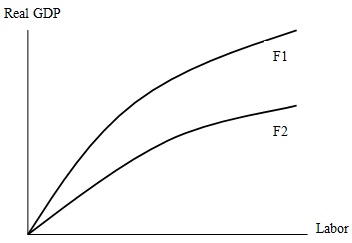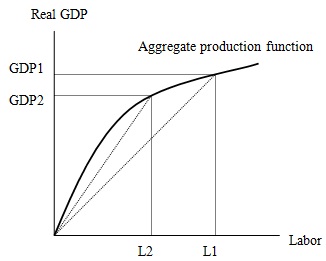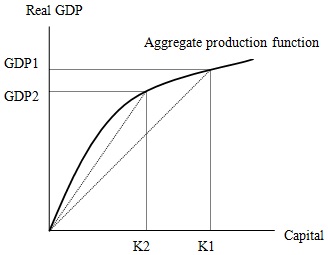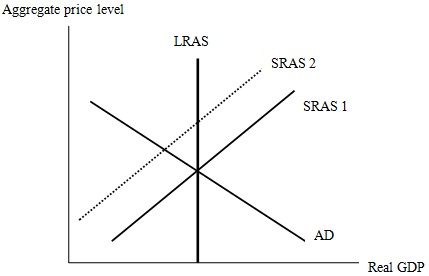Binary Choices:
Question 1. If the unemployment rate is 15% and there are 15 million unemployed people, then there are:
a) 85 million employed people.
b) 70 million employed people.
Question 2. Injections in an economy are:
a.) income earned, but not spent, in the domestic economy.
b.) spending from sources other than households in a given year.

Question 3. In the above diagram, the aggregate production function of Iraq shifts from F1 to F2. Which of the following could cause such a shift in the aggregate production function?
a.) A decrease in physical capital or human capital
b.) A decrease in the labor force due to the war
Question 4. The minimum wage is a price floor in the labor market. The basic effect on employment is that the imposition of an effective minimum wage
a) Increases the employment level.
b) Increases the unemployment level.

Question 5. In the above diagram, when the economy moves from L1 to L2,
a.) Marginal productivity of labor increases.
b.) Labor productivity decreases.
Question 6. The nominal GDP in country A was the same in 2006 and 2007. The GDP deflator in country A was higher in 2007 than in 2006. The real GDP in 2007 is
a.) higher than the real GDP in 2006.
b.) lower that the real GDP is 2006.
Question 7. Zimbabwe's nominal GDP grew by 20 percent in 2007. We can infer that more goods were being produced in Zimbabwe in 2007 than in 2006.
a.)True
b.) False
8. The aggregate production function in Keynes' Island exhibits diminishing marginal returns to labor. Investment in Keynes' Island is lower than depreciation. Holding everything else constant, labor productivity in Keynes's island will go:
a.) Up
b.) Down
Question 9. Which of the following statements about government transfer payments is true?
a.) Transfer payments are included in government spending.
b.) Transfer payments are not included in government spending because they are included in consumer spending and saving already.
Question 10. The aggregate production function in Treasure Island exhibits diminishing returns to labor. There are 2000 workers employed in Treasure Island. 500 of these workers decide to migrate to Madison. Holding everything else constant, after this labor migration labor productivity in Treasure Island will:
a.) Increase.
b.) Decrease.
Multiple Choices:
Question 11. Stan retired from his job as a chemical engineer at Monsanto. He now works part time for 15 hours a week as a Walmart greeter. Stan is
a) Frictionally unemployed.
b) Not in the labor force.
c) Employed.
d) Structurally unemployed.
Question 12. If the prices of every good in the economy increase by 5 percent, then
a.) Nominal GDP must increase by at least 5 percent.
b.) Nominal GDP must increase by less than 5 percent.
c.) Nominal GDP must decrease by 5 percent.
d.) We do not know whether nominal GDP decreases, increases or stays the same.
Use the following information for the next two questions:
Country A produces only bananas, pineapples and t-shirts. The following table contains the price of each product in 2006 and 2007 and the quantity produced in 2007.
|
|
Price in 2006 (in dollars)
|
Price in 2007 (in dollars)
|
Quantity in 2006
|
Quantity in 2007
|
|
Bananas
|
2
|
3
|
|
100
|
|
Pineapples
|
3
|
6
|
|
200
|
|
T-shirts
|
10
|
30
|
|
10
|
Question 13. What is the Real GDP for country A in 2007 in 2006 dollars?
a.) $600
b.) $800
c.) $900
d.) $1800
Question 14. What is the growth rate in the GDP deflator between 2007 and 2006?
a.) 50 percent
b.) 100 percent
c.) 200 percent
d.) There is not enough information available to answer this question.
Question 15. Rapid technological advancement in Treasure Island causes people to migrate there. According to the aggregate production model, labor productivity in Treasure Island after the technological advancement
a.) Will increase.
b.) Will decrease.
c.) Will stay the same.
d.) May increase, decrease or stay the same.
16. The following is information about Liberia.
Labor force (16 years or older) 8000 people
Number of employed workers with full time job 3500 people
Number of employed workers with part time job 3000 people
What is the unemployment rate of Liberia?
a) 37.5%
b) 81.25%
c) 18.75%
d) 123.1%
Question 17. Real GDP grew by 10 percent in China in 2005. Given that the prices of all goods in the Chinese economy had increased in 2005, the nominal GDP must have grown by
a.) more than 10 percent.
b.) less than 10 percent.
c.) 10 percent.
d.) We do not have enough information to know whether Nominal GDP grew faster, slower or at the same rate as real GDP.
Question 18. Suppose there is an increase in population so that the size of the labor force increases. Furthermore, suppose the production function exhibits diminishing marginal productivity of labor. If there is no change in technology or in the level of capital, then this increase in population will cause
a.) the equilibrium quantity of labor and the output level to decrease while the equilibrium wage and labor productivity increase.
b.) the equilibrium quantity of labor and the output level to increase while the equilibrium wage and labor productivity decrease.
c.) the equilibrium quantity of labor, wage, output level, and labor productivity to increase.
d.) the equilibrium quantity of labor, wage, output level, and labor productivity to decrease.

Question 19. The above graph shows the aggregate production function of an economy with respect to capital. The equilibrium quantity of capital decreases from K1 to K2 because of some changes in the capital market. Furthermore, suppose there is no change in the labor market. Labor productivity in this economy, given this change in capital,
a.) Increases.
b.) Decreases.
c.) Remains unchanged.
d.) Could increase, decrease or remain unchanged.
Question 20. The natural rate of unemployment refers to
a) The rate of cyclical unemployment.
b) The sum of the frictional and structural unemployment rates.
c) The sum of the underemployed workers and the discouraged workers.
d) The sum of the cyclical, frictional, and structural unemployment rates.
Question 21. Which of the following types of unemployment are taken into account in the Classical Model?
a.) Frictional unemployment
b.) Structural unemployment
c.) Cyclical unemployment
d.) Frictional and structural unemployment
Use the following table to answer the next question.
|
|
Real GDP
|
Labor Force ( number of people)
|
|
2005
|
$10,000
|
100
|
|
2006
|
|
|
|
2007
|
$30,000
|
300
|
Question 22. The labor force grew by 50 percent in 2006. The labor productivity in 2006 was the same as the labor productivity in 2005. What is the real GDP in 2006?
a.) $10,000
b.) $15,000
c.) $20,000
d.) $30,000

Question 23. In the above diagram, LRAS is the long run aggregate supply curve, SRAS 1 and SRAS 2 are the short run aggregate supply curves, and AD is the aggregate demand curve. The initial short run aggregate supply curve is SRAS 1. Suppose there is a negative supply shock due to an increase in the price of oil. Which of the following will happen to bring the economy back to a long-run macroeconomic equilibrium?
a.) Consumers and firms will change their expectations so that the AD will shift to the right in the short run.
b.) There will be an increase in consumers' wealth so that the AD will shift to the right in the short run.
c.) There will be a decrease in nominal wages so that the SRAS will shift to the right.
d.) There will be an increase in nominal wages so that the SRAS will shift to the right.
Question 24. Suppose an economy is in long run equilibrium. According to the Classical Model, a decrease in the government deficit will
a.) Have no effect on the level of real GDP.
b.) Have no effect on the real interest rate.
c.) (a) and (b) are both true statements.
d.) (a) and (b) are both false statements.
Question 25. The assumption that markets clear in the classical model means that:
a.) The price in every market is fixed, and the demand and supply curves in each market will shift so that the quantities supplied and demanded are equal at that particular price.
b.) Subsidies are paid by the government to producers and consumers so that the quantity demanded and supplied are equal.
c.) International trade is not allowed.
d.) The prices in all markets adjust so that quantities supplied and demanded are equal in each market.
Question 26. Consider the loanable funds market of an economy. Suppose there is an increase in the level of transfer payments made by the government, holding everything else constant. This will result in
a.) an increase in the equilibrium interest rate and a decrease in the equilibrium level of private investment.
b.) an increase in the equilibrium interest rate and the equilibrium level of private investment.
c.) a decrease in the equilibrium interest rate and an increase in the equilibrium level of private investment.
d.) a decrease in the equilibrium interest rate and the equilibrium level of private investment.
Answer the following two questions using the information from the chart below:
|
Real GDP or Output
|
$5,000,000
|
|
Consumer Spending
|
$1,500,000
|
|
Total Taxes
|
$500,000
|
|
Transfer Payments
|
$375,000
|
|
Government Spending
|
$500,000
|
27. What is the amount of private saving in this closed economy?
a.) $3,500,000
b.) $3,375,000
c.) $3,000,000
d.) $3,125,000
28. What is the amount of national saving in this closed economy?
a.) $3,375,000
b.) $2,999,125
c.) $3,500,000
d.) $3,000,000
29. Consider the loanable funds market for an economy. Suppose there is an increase in capital inflow (an increase in the difference between imports and exports), holding everything else constant. This increase in the level of capital inflows will cause
a.) the equilibrium interest rate to increase, while the equilibrium level of private investment decreases.
b.) the equilibrium interest rate and the equilibrium level of private investment to increase.
c.) the equilibrium interest rate to decrease, while the equilibrium level of private investment increases.
d.) the equilibrium interest rate to decrease, while the equilibrium level of private investment will increase only if the government is running a balanced budget. If the government does not run a balanced budget, then the equilibrium level of investment will decrease.
Question 30. Which of the following would not cause a shift to the short run aggregate supply curve?
a.) A sudden shortage of oil
b.) Technological advancements which result in large increases in productivity
c.) Huge increases in government purchasing associated with a war such as WWII
d.) A huge storm destroys most of a nation's food crops